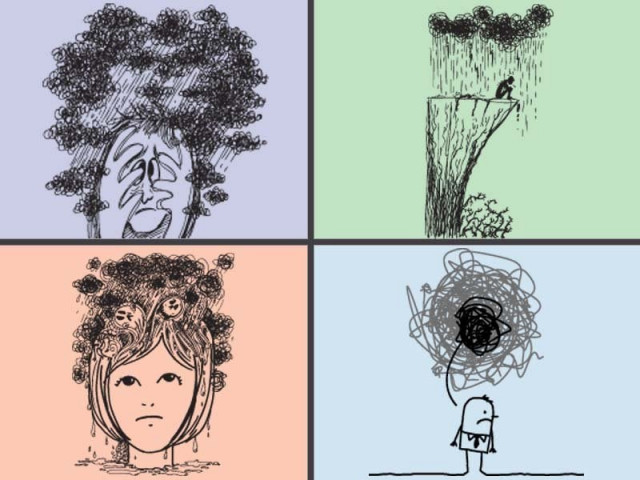Say it right
Learn how to talk to someone with depression without making them feel worse

DESIGN BY HIRA FAREED
From Bollywood starlet Deepika Padukone’s inspiring confession to Robin William’s untimely death, depression has been at the forefront of media hype for quite some time.
Sadly, most of us still remain unaware of what depression means and how to deal with it. Therefore, when we meet someone who might be suffering from it, we tend to shrug their struggles off in a thoughtless manner, which can ultimately exacerbate their situation. It is important for us to understand that depression takes different forms for different people and that certain attitudes can trigger a negative response from the patient, even though you may only be trying to help. Read on to find out what you should never say to a person with depression.
*Name has been changed to protect privacy.
Zohaib Amjad is a scientist with a major in molecular pathology. He tweets as @infectiousuni
“Stop pitying yourself all the time.”
Unfortunately, mental disorders are wrapped in stigma and many people view depressed people as fragile and incapable of facing challenges. In fact, many equate mental disorders to being crazy or perhaps a means of seeking attention. Stigmas of this sort stop us from taking their troubles less seriously.

“So many people are worse off than you are. Be grateful for what you have.”
In depression, a person is victimised by a persistently low, melancholic mood. “I felt caged by a continuous agony and feeling of hopelessness,” shares Asma Janjua*, a fourth year medical student who suffered from depression. She also adds that treasured possessions, events and relations didn’t resonate in her heart, thereby making it impossible for her to think things through.
“I was depressed for days but I was able to fight it.”
Just as every person is different, the situations they are hit by differ greatly too. Viewing a patient’s problems in your own light only acts as a hindrance in understanding depression. “Even a depressed person is incapable of walking in another depressed person’s shoes. This is how intricate depression and our human minds are,” states Dr Amanat.

“Life is bound to be difficult sometimes. You are not the first person with issues.”
According to Dr Amanat Mohsin, a psychiatrist at the Gulshan Psychiatric Hospital in Karachi, people are bound to feel differently at different times. “At times, a person may feel jubilant, but get melancholic after a while. Every day is different,” he says. Depression is a way our bodies respond to stress and functional changes. Fatigue, eating disorders and even suicidal thoughts become common, rendering an individual incapable of getting through life. In such a situation, trivialising their difficulties can trigger a harmful impact.
“Cheer up, life is too short to be depressed.”
“When people told me this, I was left perplexed,” says Asma. “Statements like these make it sound as if one enjoys being depressed.” In actuality, they seem more negative to patients than intended and serve as a reminder that their attempts to vanquish the disorder are weak and uncommitted.

“Medication isn’t the way to cure depression.”
Depression is a mental health condition that can endure for life. Sometimes, that means having to undergo therapy and taking medication for the rest of your life. We need to understand that in reality, there’s no final cure for the disorder and meds aren’t always reliable as they can cause the mental health conditions to vary over time. They do, however, provide temporary relief.

“You are stronger than this.”
By shunning the problems and struggles a patient may want to talk about, you can unintentionally demotivate them. “The most important part in helping a loved one cope is to listen to them thoroughly. After all, they have doled out trust in you to share their problems,” says Dr Amanat. Remember, affected persons need time from their loved ones.

“Try harder.”
The feelings of isolation experienced by patients are the biggest opportunities for loved ones to help. “We need to make the affected person understand that he/she isn’t well and that we will be there with them throughout,” says Dr Amanat. Therefore, asking the patient to try hard to get out of the situation only makes them feel more vulnerable about their surroundings. This often takes a toll on the patient, discouraging them from trying to help themselves.
Published in The Express Tribune, Ms T, June 7th, 2015.



















COMMENTS
Comments are moderated and generally will be posted if they are on-topic and not abusive.
For more information, please see our Comments FAQ